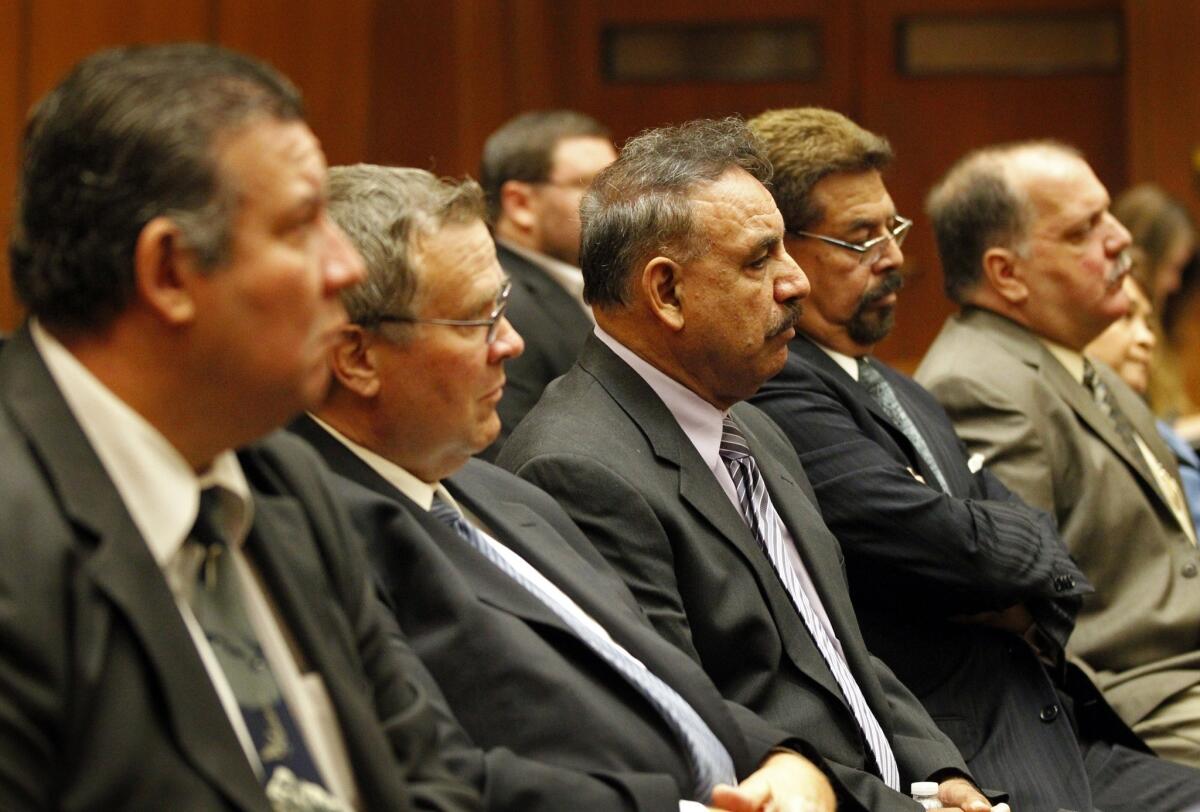Bell jurors ordered to begin anew after panelist is dismissed

After nearly five days of deliberations, jurors in the Bell corruption trial were ordered Thursday to begin anew after a member of the panel was dismissed for misconduct and replaced by an alternate.
The original juror, a white-haired woman identified only as Juror No. 3, told Los Angeles County Superior Court Judge Kathleen Kennedy she had gone onto a legal website to look up jury instructions and then asked her daughter to help find a definition for the word “coercion.”
Although all but one defense attorney requested that the woman stay, Kennedy said the juror needed to be removed. “She has spoken about the deliberations with her daughter, she has conducted research on the Internet, and I’ve repeatedly, repeatedly throughout this trial — probably hundreds of times — cautioned the jury not to do that,” the judge said.
The removal came after jurors notified the judge that they were deadlocked and that continued deliberations seemed fruitless.
It was unclear how to interpret the day’s events, whether the dismissed juror had been a lone holdout or an indication of a fractured jury.
The juror started to tell the judge which way she was leaning in the case, saying she had gone online “looking to see at what point can I get the harassment to stop.... How long do I have to stay in there and deliberate with them when I have made my decision that I didn’t think there was —”
Kennedy cut her off before she could finish.
The woman clasped her hands over her mouth and said, “I’m sorry.”
Two defense attorneys thought she was leaning toward acquittal and wanted her to stay. “I would have preferred the deadlock to a guilty verdict,” said Alex Kessel, the attorney for George Mirabal, one of six former council members charged with misappropriation of public funds.
The council members are charged with inflating their salaries in what prosecutors contend was a far-reaching web of corruption in which fat paychecks were placed ahead of the needs of the city’s largely immigrant, working-poor constituents.
When attorneys and defendants were summoned to the courtroom Thursday morning, they were initially told that the jury appeared to be deadlocked.
“Your honor, we have reached a point where as a jury we have fundamental disagreements and cannot reach a unanimous verdict in this case,” read a note signed by two jurors, including the foreman, that was given to Kennedy.
A note from another juror alerted the judge that Juror No. 3 had consulted an outside attorney. That did not appear to be the case, but her other actions were revealed under questioning from the judge.
The same juror made a tearful request Monday to be removed from the panel because she felt others were picking on her. Kennedy told the woman that although discussions can get heated, it was important to continue deliberating.
On Thursday, however, the juror again broke into tears and said she had spoken with her daughter about “the abuse I have suffered.” She said her daughter told her, “Mom, they’re trying to find the weak link.”
The woman said she had turned to the Internet to better understand the rules about jury deliberations and came across the word “coercion.” After her daughter helped her look up the word’s definition, she wrote it down on a piece of paper and brought it with her to court. When the judge asked to see the paper she went into the jury room to retrieve it.
The woman later left the courtroom in tears.
With an alternate in place, Kennedy told the panel to act as if the earlier deliberations had not taken place. The alternate had sat in the jury box during the four-week trial but did not take part in deliberations.
Former council members Luis Artiga, Victor Bello, George Cole, Oscar Hernandez, Teresa Jacobo and Mirabal are accused of drawing annual salaries of as much as $100,000 a year by serving on boards that did little work and seldom met, part of a scandal that drew national attention to the small city in 2010.
Prosecutors said that Bell’s charter follows state law regarding council members’ compensation. In a city the size of Bell, council members should be paid no more than $8,076 a year.
The trial began in late January, and the case went to the jury last Friday.
As the jury resumed deliberations in downtown Los Angeles, the verdict was clearly in on the streets of Bell.
One resident unfurled old protest banners and signs from the days when the pay scandal was first exposed and then called former members of an activist group that had led the charge for reform in the city.
“We’re holding our breaths and waiting,” Denise Rodarte, a member of the grassroots group Bell Assn. to Stop the Abuse, said in regard to a verdict.
“It’s cut and dry: Local elected officials were supposed to make a certain amount of money, and they made a lot more.”
Times staff writer Ruben Vives contributed to this report.
More to Read
Sign up for Essential California
The most important California stories and recommendations in your inbox every morning.
You may occasionally receive promotional content from the Los Angeles Times.












